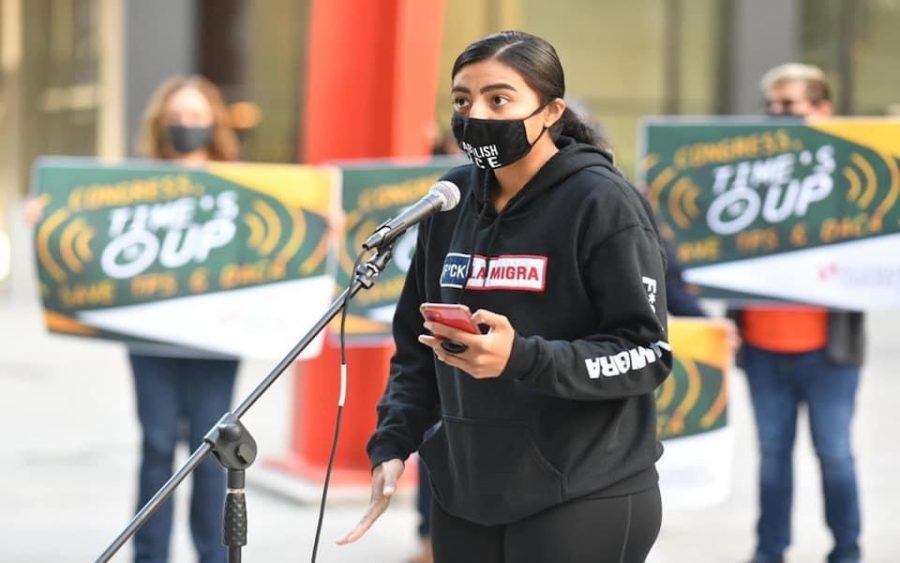Evanston, Chicago residents ineligible to vote work to mobilize peers and communities
A young non-voter speaks at a protest for the rights of Deferred Action for Childhood Arrivals (DACA) recipients. The future of DACA hangs in the balance in this election, DACA recipient and Alianza Americas staff member Dulce Dominguez said.
November 3, 2020
As candidates and organizers push their “get out the vote” efforts in the final hours leading up to the 2020 election, Evanston and Chicago residents not eligible to vote are also working to mobilize voters in their communities.
Members of the Evanston Township High School Civic Engagement Committee, a subgroup of the school’s Community Service Club, held a September “chalk-out” to discuss campaign issues — including climate change, healthcare and the Illinois Fair Tax — and started an Instagram page in June to educate their peers on local issues, encouraging those 18 and up to vote.
Committee leader Ben Ward is an ETHS senior and not yet old enough to vote, but he said he’s been following the election closely.
“It seems like an overwhelming amount of young people are in favor of climate action and stronger gun control,” Ward said. “Those people are going to be able to vote very soon, or are starting to vote now, and I think that’ll cause some change.”
The group has geared most of their content and events toward these soon-to-be voters, Committee leader and ETHS junior Mira Littmann said. Littmann draws most of the graphics for the group’s Instagram page, which in recent weeks has included information about local races and a guide on how to encourage friends and family to get to the polls.
Littman said she’s seen her peers become increasingly more vocal about politics on social media since protests for racial justice began this summer.
“I’ve been paying a lot of attention to the Black Lives Matter movement, and I read the news every day and try to stay informed,” Littmann said. “Everybody I follow has been reposting things that they believe in or talking to their followers, so it makes me really happy to see that people are caring.”
Committee leader and ETHS junior Lauren Dain said she and many fellow students attended Black Lives Matter protests over the summer, and they have continued these conversations about racial justice and politics in their virtual classrooms this fall.
As a community service group, the committee strives to remain nonpartisan and encourage all students to get politically involved, so Dain feels hopeful seeing her peers engage with the cause, she said.
“In different forms of activism, whether it’s through social media or showing up to protests, I feel like there is a new wave of youth activism,” Dain said. “Leading up to the election, that has continued, which is really great.”
Chicago resident and DACA recipient Dulce Dominguez has also been working to encourage political engagement among both voters and non-citizens ahead of the election. As development and communications coordinator for Alianza Americas, a network of organizations nationwide advocating for immigrants’ rights, Dominguez helps mobilize people in immigrant communities.
Dominguez said she tells other non-citizens that while they cannot cast a vote themselves, they can make eligible voters aware of the issues affecting immigrant populations.
“Our stories have power,” Dominguez said. “It’s about building a more realistic, tangible image or narrative for people that are eligible voters to understand that their vote has the power to change the lives of many others who might not share the same story as you, but nonetheless are humans.”
With some members of her family eligible to vote and others undocumented, Dominguez said she’s used to communicating with reluctant voters. She has organized phone banking sessions and helped craft informational videos and flyers on voting in the final weeks before the election.
A campaign issue that especially worries her is COVID-19 relief legislation — laws that prevent immigrants from accessing social services have also barred them from accessing COVID-19 relief funds in many states.
“Regardless of what the outcomes are this week, it’s important for people to be as engaged as they have been to ensure that we’re really pushing our legislators and our community decision makers to break those barriers that have been hurting immigrant families,” she said. “While our own vote is not possible, we have the power to make sure that people are aware of what’s at stake.”
Email: [email protected]
Twitter: @maiapandey
Related Stories:
— The Daily Northwestern’s 2020 election guide for Evanston voters
— Wildcats promote civic engagement and voting ahead of election
— International students talk upcoming election, Trump immigration policies


